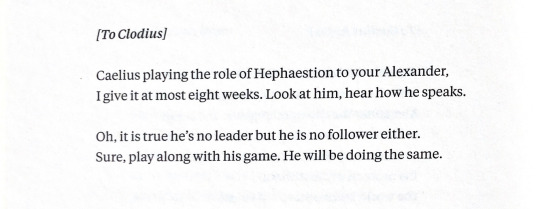#elegiac couplet
Explore tagged Tumblr posts
Text
Woe is me! That boy had arrows that hit the mark. I burn, and Love is king in my empty breast. Me miserum! certas habuit puer ille sagittas. Uror, et in vacuo pectore regnat Amor. -Ovid, Amores I.1.25-26
#classics#tagamemnon#Latin#latin language#lingua latina#translation#Latin translation#poem#poetry#poetry in translation#Ovid#Ancient Rome#Roman Empire#amatory elegy#elegiac couplet#Amores
135 notes
·
View notes
Text
ancoram amat navis sicut flammam focus ardet:
cupidine satis larem ut eam faciat.
"A ship can never truly love an anchor." dude shut up. a ship without an anchor gets dashed against the rocks. it's useless, completely at the whim of the currents. a ship loves an anchor so much it carries it everywhere it goes. the anchor gives the ship the world to love. dude.
140K notes
·
View notes
Text

Semester started again 😬📚 Bye to spending all day writing fanfiction (original fiction too, I swear), hello Dark Academia, and being hungover in Greek class 🙃
#metalhead#metal girl#metalhead girl#inked girls#tattoo#lithuanian girl#baltic#baltic demon#baltic girl#witch#baltic witch#band shirt#archgoat#alt girl#goth girl#classical studies#dark academia#i definitely could be happier 😅#i don't like being kept away from my stories for a moment be they original or fanfics#not that the lectures aren't thrilling#when they aren't sitting idle while people stumble through the same lines of hexameter waiting your turn#we're reading plato in greek class#letters in latin#letters that are in elegiac couplet
34 notes
·
View notes
Text

John Heartfield
- Cover for Den Schi Chua
1932
The cover photograph is from Dr Sun Yat-sen's elegiac couplets, 1925.
34 notes
·
View notes
Text
Iliad Couplets
One elegiac couplet for each book in the Iliad. Out of order cause that's how my brain works.
Since English doesn't really lend itself to spondees, I'm using strict dactyls except for the final foot of the first line, where I'm following Schiller's example and using a trochee instead.
So if I get it right, the rhythm ought to be
_ . . | _ . . | _ . . | _ . . | _ . . | _ .
_ . . | _ . . | _ | _ . . | _ . . _
10 notes
·
View notes
Text

Anna Jackson, I, Clodia
#there are some Takes in this poetry collection. and im gnawing on them#(poems ordered in a chronological narrative and this one is post clodius sacrilege trial and just pre clodia/caelius affair)#also the way this is in elegiac couplets is making me go auhauhyufsfguyahedfahejf#poetry#marcus caelius rufus#beeps
150 notes
·
View notes
Text
Look, I'm a teacher, and I agree that popular generative AIs are not very useful for most of the things that people are using for. But if you are making really aggressively mean posts that boil down to "the thing that you are actively using every day and feel through experience is working for you doesn't actually work because I (a person who has said I never use it) say that it doesn't" do you genuinely think that is going to convince anybody?? And if you don't think it's a good method to actually convince the people you are attacking, than you are just being mean on the internet for internet points. which. typical. But try to recognize it, I guess.
#original#I mean if the argument was better saying shit like “you have brainrot” to people is obviously not a way to make them listen to you#if you're just venting#fine i guess#but phrasing it as a#actual suggestion or argument is not the way then#wait now im thinking about my literary polemic in martial article#i take it back you can be as mean as you want but only if you do in hendacasyllables#or elegiac couplets#choliambs will not be accepted
1 note
·
View note
Text

#carmina gigantia#elegiac couplets#elegiac distych#latin poetry#they might be giants#latin language#latin langblr#Spotify
0 notes
Text



Four Treasures of the Study · 文房四宝
蒲一永 Pu Yi Yong · The Brush
Eight Principles of Yong. Traditionally, it was believed that practicing the eight common strokes in regular script, all of which can be found in the character "Yong," could lead to writing all characters well. According to legend, it was created by Wang Xizhi in the Eastern Jin Dynasty, "Yong" is also the first character in his famous work 蘭亭集序 Lantingji Xu (Preface to the Poems Collected from the Orchid Pavilion). The surname "Pu" could potentially be a homage to the famous Chinese writer Pu Songling in the Qing Dynasty. In his most popular work 聊齋誌異 Liaozhai Zhiyi (Strange Tales from a Chinese Studio), the focus of the tales are on the emotional entanglements between humans and supernatural beings in the world.
陳楮英 Chen Chu Ying · The Paper
Chu, which refers to the paper mulberry plant, was historically used in ancient China as the raw material for making mulberry paper and Xuan paper. Additionally, "Chu" was used as a term synonymous with paper in ancient times. In EP4, Chuying mentioned that the "chu" in her name means paper.
曹光硯 Cao Guang Yan · The Inkstone
Yan, also known as Yantai, is the name of the inkstone used in calligraphy. The inkstone is used to grind the ink stick into powder, which is then mixed with water on the inkstone to create ink suitable for calligraphy.
執念 The Obsessions · The Ink
The obsessions are one of the ever-changing elements in the show, the elegiac couplets are uniquely written with whole heart and mind for the different obsessions.
#oh no! here comes trouble#oh no here comes trouble#不良執念清除師#不良执念清除师#twdramaedit#asiandramasource#dailyasiandramas#cdramasource#dramasource#twdrama#taiwanese drama#caps#chinese stuff#pu yiyong#Tseng Jing Hua#chen chuying#vivian sung#sung yun hua#Peng Cian You#cao guangyan#i dont even know if this is even interesting to anyone im just splurging thoughts and random meta#this post took 10yrs to make can you believe trying to do the write up was harder than trying to make the gifs#half way through making the gifs i realised i did it in simplified and when i tried to switch to traditional the font didnt work 🥴#i was trying to find a scene where guangyan was in his doctor action but i didnt want to use the cpr scene bc sads#this is he best one i could find where he's wearing a lab coat
339 notes
·
View notes
Text
Latin Poetry Composition for the Autodidact
The other day, a mutual mentioned on a post about wanting to learn poetry. There really is a dearth of resources for it, and I think we actually miss out on much of the poetry we love by not being able to write it ourselves.
Before we start I want to say that this is now how I did it. I’m a Latin teacher who uses spoken Latin 6 class periods per day, every day. When I’m not speaking it, I’m also writing and listening to it. The amount of input and practice producing and internalizing the natural rhythms of Latin I have as a professional is not something everyone can do and puts a big asterisk next to any advice I give.
I think my other disclaimer is just that this is a recommendation (albeit one based on my experience and training as a Latin teacher). Don’t feel like you “aren’t allowed” to write hendecasyllables if you have no interest in hexameters.
How to physically create a poem I really recommend pen and paper. Sometimes I’ll write out just the basic idea images or themes and then versify it. Other times I get a nice sounding bit and try to build around it. It’s a very non linear process so don’t feel like you have to start at the beginning or the end. Just try to find a foothold somewhere and grow out from there. For me it involves a lot of trial and error. Usually my first goal is to get something that fits the meter. Then, I ask if it sounds good. Then I ask if it’s artistically what I’m looking for. Lots of writing, scanning, and looking for words that fit the meter, rescanning, ita porro.
I really don’t recommend writing too much English if you can help it. If you can say what you want in English, there’s no need to obscure it with Latin! To that end, if you’re really new to Latin composition, I’d start with prose and getting good at internalizing styles and tones.
More than anything, have fun! Don’t feel like you are required to complete a textbook or do certain drills in a certain order before you get into the poetry you want to write. Let the Muse sing to you!
Really all you need to get started is this or this and an idea. With practice youll be ready for more stuff and then can reference the materials ive posted.
Table of Contents: (follow the links to the different guides)
1, Prose, or getting started writing in Latin
2, Haikus
3, Hexameter
4, Elegiac Couplets
5, Hendecasyllables and Reading Poetry
6, Explanations of some of the more complicated rules and links to important resources, tutorials, and practice drills
17 notes
·
View notes
Text
Ovid Daily's Summer Book Club 2023:
The Heroides
The first fifteen poems feature letters (written in elegiac couplets) from famous heroines of myth to their lovers, including: Penelope to Odysseus, Dido to Aeneas, Medea to Jason, among many others. The last six (aka the Double Heroides) are paired letters from heroes and responses from heroines, including Paris and Helen, among others.
The Heroides will run from Monday, July 10, 2023 to Monday, September 25, 2023. Each poem will be spread over 2 to 3 days, depending on its length. The Latin and translation will be those featured in Grant Showerman's 1914 edition.
Schedule:
July 10 & 11: Penelope to Odysseus
July 13 & 14: Phyllis to Demophoon
July 17 & 18: Briseis to Achilles
July 20 & 21: Phaedra to Hippolytus
July 24 & 25: Oenone to Paris
July 27 & 28: Hypsipyle to Jason
July 31 & August 1: Dido to Aeneas
August 3 & 4: Hermione to Orestes
August 7 & 8: Deianira to Hercules
August 10 & 11: Ariadne to Theseus
August 14 & 15: Canace to Macareus
August 17 & 18: Medea to Jason
August 21 & 22: Laodamia to Protesilaus
August 24 & 25: Hypermnestra to Lynceus
August 28 & 29: Sappho to Phaon
August 31, September 1 & 2: Paris to Helen
September 5, 6 & 7: Helen's response to Paris
September 11 & 12: Leander to Hero
September 14 & 15: Hero's response to Leander
September 18, 19 & 20: Acontius to Cydippe
September 23, 24 & 25: Cydippe's response to Acontius
65 notes
·
View notes
Text
hey @ classicists dumb question. propertius' elegiacs IV was written in elegiac couplets right
#like i've been sounding them out and i'm Pretty Sure i'm right but ?#personal#also ok actually even knowing this doesn't help at all because i need to find a source#BUT everywhere online assumes it's a given. which like it is but it's a v basic course i'm doing so idk if i can just assert it yfm.#since the bit i'm looking at is in translation
4 notes
·
View notes
Text
~~~
Bene. Latine:
In hasta quidem mihi panis depstus, sed in hasta vinum Ismaricum, biboque in hasta me sustinens.
Hard-Won Leisure
Archilochus, fr. 2 = Athenaeus Deipnosophistae 1.30f In my spear, my kneaded barley-bread; In my spear, my wine from Thracian Ismaros; On my spear I lean as I drink deep. ἐν δορὶ μὲν μοι μᾶζα μεμαγμένη, ἐν δορὶ δ᾽ οἶνος Ἰσμαρικός, πίνω δ᾽ ἐν δορὶ κεκλιμένος.

The Connoisseur, Ernst Emmanuel Müller (1844-1915)
#classics#tagamemnon#Ancient Greece#Archaic Greece#poem#poetry#translation#poetry in translation#Archilochus#elegiac poetry#couplet#elegiac couplet#Greek poetry#Ancient Greek poetry#Ernst Emmanuel Muller#latin#latin language#latin translation#lingua latina#latin fandom#latin meme#latin memes#meme#memes#greek meme#greek memes#Greek#Greek language#Greek translations#lingua graeca
25 notes
·
View notes
Text
#what the fuck can I tag this with#my number one keeps changing depending whether i read latin or french lol#and octosyllabe is just very nice and steady I like it as 3rd#my poll#polls#literature#poetry
6 notes
·
View notes
Text
hello! does anyone here like elegiac couplets?
1 note
·
View note
Text
wilson saying alexandrines ‘felt like wet, unrisen dough, lacking the quick energy of [dactylic hexameter] 🤝 alexander pope saying ‘a needless alexandrine ends the song, / that, like a wounded snake, drags its slow length along.’
#well what if i like alexandrines.#<- guy who is weird about the caesura in elegiac couplets#wiliad#beeps
26 notes
·
View notes